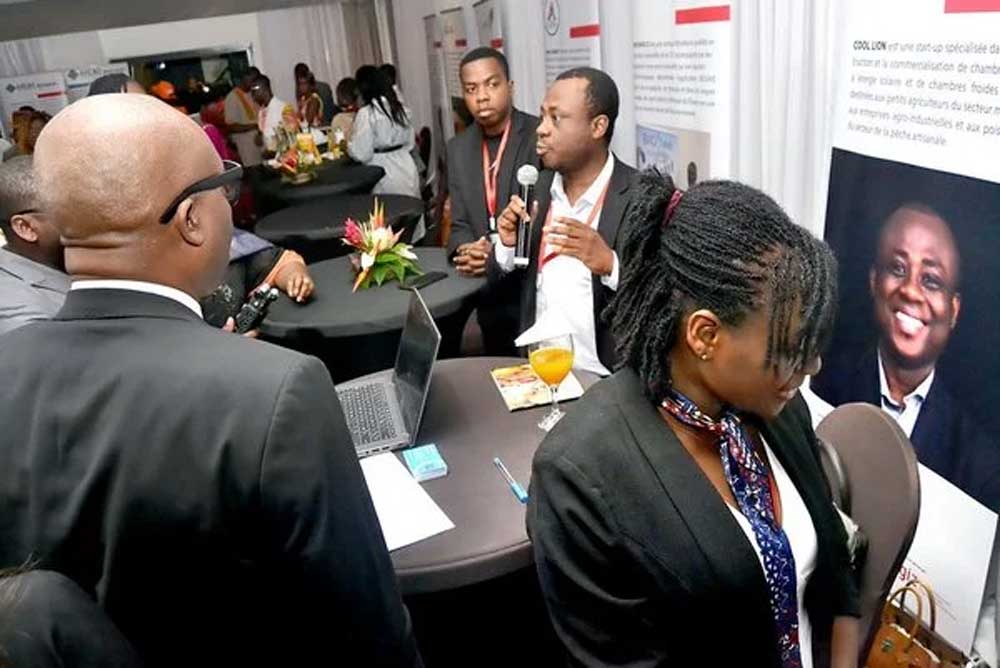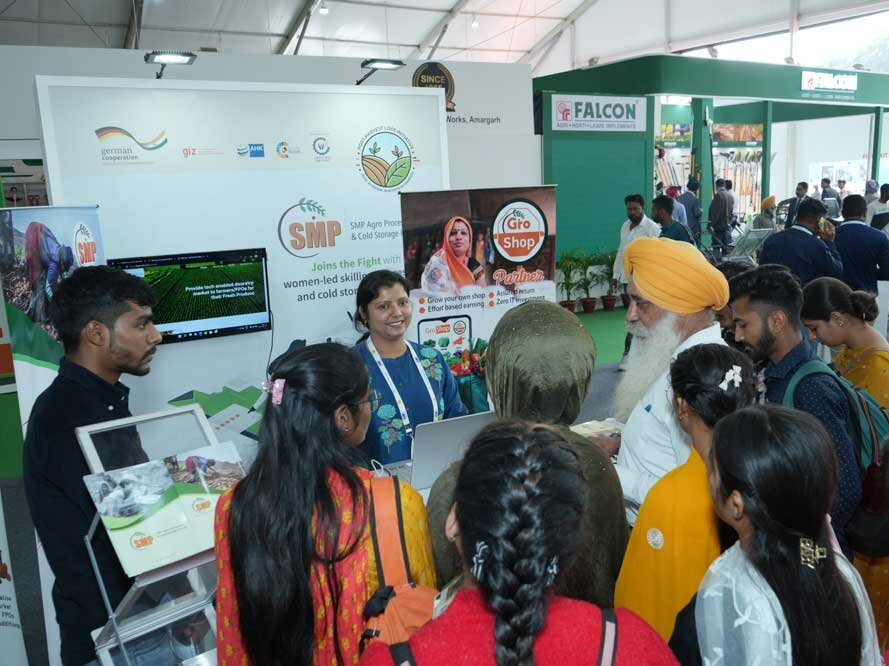DLG-GIZ cooperation: Reduction of post-harvest losses
By Thomas König, Deutsche Gesellschaft für Internationale Zusammenarbeit (GIZ) GmbH
The topic reduction of post-harvest losses was introduced using two hybrid, interactive formats at events in India and Côte d'Ivoire at the end of 2022. At CII Agro Tech India 2022, the Indo-German Chamber of Commerce organised a large-scale pavilion to showcase these formats, while the German Agricultural Society (DLG) held a two-day conference in Côte d'Ivoire in December 2022. Both events were organised on behalf of Deutsche Gesellschaft für Internationale Zusammenarbeit GmbH (GIZ) and funded by the German Federal Ministry for Economic Cooperation and Development (BMZ).
To date around 820 million people face severe hunger globally. Thus reducing post-harvest losses (PHL) — saving what is already produced —plays an important role in addressing world hunger. One challenge lies in how to best reach a large number of people and raise awareness on how to convince actors along food value chains to take action to reduce these losses. One option is via large-scale exhibitions, with opportunities to display solutions and technical equipment, inform visitors management requirements, conduct panel discussions and facilitate exchange among practitioners, advisors and business partners. As innovations today play an essential role, it is important to provide start-ups the space to showcase their solutions during trade fairs and virtual formats.
A digital platform where most of the information can be accessed and opportunities to post exchange and cooperation has been able to complement the exhibition, continuing the dialogue for a longer period of time. Known as a “hybrid trade fair format”, this concept combines all of the activities above, extending awareness longer than just the few days of the special event. GIZ GmbH has conceptualised this approach and has been commissioned by the BMZ to implement this new format in 2022 in two countries: India and Côte d'Ivoire.
Chandigarh, India, November 2022: 15thCIIA Agro Tech India
"Protection of Crops, Protection of Future” (Fasal Ki Raksha, Bhavishya Ki Suraksha) was the title of a pavilion where the Indo-German Chamber of Commerce (IGCC) offered its digital and analogue contribution at the fair in Northern India. (agrotech-india.com)
The event´s digital format started with hybrid workshop sessions during the trade fair. More than 900 people joined virtually. Meanwhile, around 4,300 visitors visited the 312 square metre pavilion over the event’s four days.
The pavilion featured three main areas:
- Agriindia.net Experience Zone– Visitors were invited to discuss the content of the digital platform www.agriindia.net, which will be hosted in future by the Indian Central Institute of Post Harvest Engineering & Technology (CIPHET).
- Proper Post-Harvest Practices Experience Zone – Promoting proper PHL-practices particularly in the tomato, onion and potato value chains, this section motivated visitors to discuss videos and fact sheets displayed in English and Hindi.
- Start-up Zone– 16 startups and GIZ´s Green Innovation Centre, India, presented their solutions and activities, encouraging visitors to interact on business terms.
Abidjan, Côte d´Ivoire, December 2022
DLG International organised the two-day “Post-harvest Losses Hybrid Conference” in Abidjan instead of exhibiting at a large agricultural trade fair. The theme of the conference was revealed during open remarks, which noted that post-harvest losses were “one of the major problems in agriculture in African countries”, acknowledging that “Côte d´Ivoire cannot get away with losing up to 40 per cent of its harvested food”. H.E. Kobenan Kouassi Adjoumani, Minister of Agriculture and Rural Development, Côte d´Ivoire, told attendees: "Food loss reduction seems to be a major pillar of upcoming national food strategies. We have to invest more in technologies.”
The conference aimed to make PHL-technologies more visible while providing space and opportunities for discussions on what is needed or what business models could look like. Videos, factsheets and background information on PHL technologies and management requirements have been produced for the conference and are now available online at: Innovations post-récolte – Plateforme de réduction des pertes post-récolte (www.innovations-postrecolte.org).
The digital platform has been officially handed over to the local organisation CERFAM (Regional Centre of Excellence against Hunger and Malnutrition), which will host it in the long term. Although it focuses particularly on cassava, mango and vegetables, the techniques and business models are not limited to these value chains.
GIZ´s Green Innovation Centres (GIAE) in both countries played their part in making the two events a success. By displaying their work and achievements in reducing PHL losses and adding value by utilising by-products, GIAEs added valuable input to prepare and implement the events.
In both countries, start-ups that participated in the events competed against each other for innovation awards.
Generally positive feedback indicates that post-harvest losses do matter in many food value chains and that the need to make significant improvements in this respect has been acknowledged.




